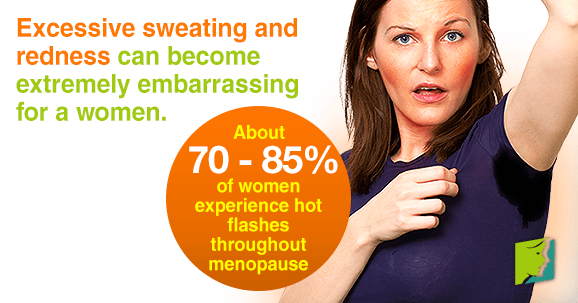Running out of her favorite restaurant, turning her house into an igloo, having poor concentration at work - these are some of the ways that hot flashes can affect a woman's life. It's important be aware of what exactly women go through during their menopausal bursts of heat.
Before the Flash
Before a hot flash episode even occurs, women can be impacted by both noticeable and more discreet factors.
Hormones
Estrogen levels plummet during menopause. This directly affects the hypothalamus, which is essential for regulating body temperature, causing the brain to sends out signals to release heat. Essentially, the body's internal thermostat starts malfunctioning.
Worry
Women who experience regular hot flashes worry about when their next hot flash will be. Many are hesitant to visit friends and family if they fear that their home is not properly cooled or ventilated. It can make public transport, busy streets, or bustling restaurants an absolute nightmare. Going to the beach or vacationing in the tropics begins to sound dreadful.
Preparation
Wearing layers, carrying an ice pack or portable fan, and monitoring the amount of caffeine, alcohol, and sugar she consumes, are all important preparation methods for a hot flash.
During the Flash
Many women experience additional symptoms or signs of a hot flash in the midst of an episode.
Dizziness
Fatigue, nausea, disorientation, and weakness often occur. Some women can even become unsteady and lose their balance. It's important for a woman to be seated if she is feeling any dizziness during a hot flash.
Burning
Blood vessels dilate, body temperature rises, and skin becomes hot to the touch. To many women, this fiery feeling is the worst symptom during a hot flash. A woman may feel like her chest, neck, face, and back are flushed and absolutely scorching.
Sweating
Since the body is experiencing extreme heat, the brain send alerts to cool down. Sweating is an internal mechanism humans have to cool off.
After the Flash
Many women continue to feel the effects of a hot flash even after it has passed.
Disrupted lifestyle
Hot flashes can interfere with daily routines. During a business meeting, it may become nearly impossible to concentrate. In personal life, it may be extremely difficult to stay engaged. Some women have to leave meetings to tend to the aftermath of their hot flashes.
Alienation
The excessive sweating and redness can become extremely embarrassing for some women. About 70 - 85% of women experience hot flashes throughout menopause. If you feel that your hot flashes are severely disrupting your daily life, talk to a doctor about possible medical treatments.
Sources
- Beast Cancer.org. (2013). All About Hot Flashes. Retrieved January 23, 2014, from http://www.breastcancer.org/tips/menopausal/facing/hot_flashes
- Kronenburg, F. (1990). Hot flashes: epidemiology and physiology. Annals of the New York Academy of Sciences, 592, 52-86. Retrieved from http://www.ncbi.nlm.nih.gov/pubmed/2197954




